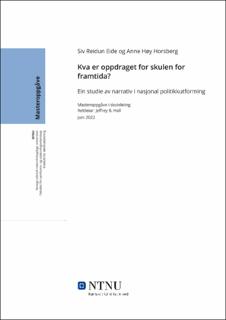Kva er oppdraget for skulen for framtida? Ein studie av narrativ i nasjonal politikkutforming
Master thesis
Permanent lenke
https://hdl.handle.net/11250/3024821Utgivelsesdato
2022Metadata
Vis full innførselSamlinger
Sammendrag
Samandrag
Tittel: Kva er oppdraget for skulen for framtida? Ein studie av narrativ i nasjonal politikkutforming
Studien tek utgangspunkt i problemstillinga: Kva narrativ om oppdraget til skulen er å finne i den nasjonale politikkutforminga i samtida, og gir narrativa eit einskapleg oppdrag for skulen for framtida? Føremålet er å identifisere dei forteljingane i nasjonal samtidig politikkutforming som etablerer samanhengar mellom problem-, føremål- og kompetansesynet for skulen og opplæringa. Undersøkingane søkjer vidare å fastslå om narrativa gir føremåls- og innhaldsarbeidet i skulen ei sams retning. Dokumenta til grunn for analysane er Perspektivmeldingen 2021 (Finansdepartementet, 2021), Høring Forslag til ny opplæringslov (Kunnskapsdepartementet 2021b og c), Fullføringsreformen – Med åpne dører til verden og fremtiden (Kunnskapsdepartementet 2021a), En skole for vår tid. Sluttrapport Ekspertgruppe for skolebidrag (Ekspertgruppe for skolebidrag 2021) og Overordna del (Kunnskapsdepartementet, 2017).
Undersøkingane har ei vitskapsteoretisk plassering innanfor diskursanalysen. Carol Bacchi (2009) sin «What’s the problem represented to be»-analysestrategi (WPR) er retningsgivande for det analytiske arbeidet. Metodologisk kombinerer studien WPR-tilnærminga med ei narrativ undersøking (Fischer 2003). Ved hjelp av forskingsspørsmåla kva er framstilt som problem som kan hindre oppnåing av føremåla med opplæringa?; kva er framstilt som føremåla med opplæringa; kva er framstilt som kompetansebehova for framtida; og kva er framstilt som styringsgrep som vil gje oppnåing av føremåla, finn studien skulepolitiske narrativ gjennom fire sekvensielle strukturelement (problem, føremål, kompetanse, styringsgrep). Gjennom analysar og drøfting identifiserer studien dimensjonar ved kompetanse- og føremålsframstillingar som dominerer på tvers. Dette gir grunnlag for å dele narrativa om skulen i to hovudgrupper; Me har fått fram ei hovudforteljing om ein skule som problematiserer at den i for liten grad varetek det som med Gert Biesta si føremålstredeling (2015) kan kallast skulen sin kvalifiserande funksjon for nasjonen og samfunnet. Studien viser at ei føremålsrasjonell framstilling av den arbeidslivsrelevante, produktivitetsfremjande og sluttkompetanseorienterte skulen er framtredande i narrativa. Narrativa etterlyser meir utbyteorientert, «relevant», «etterspurt» og «framtidsretta» kompetanse. I den andre hovudforteljinga vert skulen sitt doble oppdrag understreka, og problematiseringane er sentrert kring i kva grad organisering og skuleutviklingspraksis stettar eit føremål der balansen mellom dei ulike føremålsdimensjonane er tatt i vare.
Utforskinga av narrativ har fått fram eit bilete av kva som er normaliserte måtar å forstå kunnskap og kompetansebehovet i samfunnet og skulen sitt føremål på. Ei tydeleg forteljing om eit skilje mellom «rett» og mindre «rett» kompetanse, viser at det er vesentleg å vurdere styringssignal om kompetanse i samanheng med kva slags normativ grunngjeving eller føremålstenking kompetansen er følgt av. Studien argumenterer for at kombinasjonen av WPR-tilnærming og narrativ analyse gir ei ramme for å forstå og utfordre dei samanhengane og retningsvala narrativa etablerer. Medvit om dette vil òg vere viktig i dagleg skulepraksis. Abstract
Title: What is the objective of the education for the future? A study of narratives in Norwegian policymaking
This thesis addresses the question: What educational narratives regarding the objectives of the educational system can be found in present Norwegian policy documents, and are these perspectives pointing to a common future objective? Aiming to identify educational narratives in Norwegian policy, the study examines how narratives establish certain ways of connecting problematisations, the purpose of education, and views of competence. Furthermore, the purpose is to determine whether the policy narratives points in the same direction. The documents included are White paper no. 14 (2020-2021) – Long-term Perspectives on the Norwegian Economy 2021 (Ministry of Finance, 2021), Hearing Proposal for a new Education Act (Ministry of Education and Research 2021b and c), White Paper no. 21 (2020-2021) Upper Secondary Education Completion Reform – Opening doors to the world and the future [our translation] (Ministry of Education and Research 2021a), The school for our time. Final report from the expert group for school performance indicators [our translation] (Expert group for school performance indicators 2021) and the Core Curriculum (Ministry of Education and Research, 2017).
The study has a discourse analysis approach. Analytical strategies were guided by Carol Bacchi’s (2009) "What's the problem represented to be" approach (WPR). Methodologically, the WPR approach is combined with a narrative policy analysis (Fischer 2003). The fundamental questions ask how the policy documents addresses the following issues: What is presented as the purpose of education? What competence is needed for the future? What are presented as problematisations to achieving the objectives? What is presented as management plans that will result in achieving key objectives? The analysing work correspondingly identifies educational narratives through four sequential structural elements: problematisations, objectives, competence, and management.
Through analyses and discussions, the study identifies dimensions of competence and objectives to dominate across the policy documents. This further suggests that the narratives identified can be divided into two main groups. The first is a school that does not properly address what in accordance with Gert Biesta's three domains of purpose (2015) can be called the qualification domain of education. The study shows that a presentation of the working life-relevant, productivity-promoting and outcome/final-competence-oriented school is prominent. There is a call for "relevant", "in-demand" and "future-oriented" competencies. In the second main group, the school's double mission is emphasized, and the discussions are centred around the extent to which organisation and school development practices support the balance between these purposes. The study has highlighted normalized ways of framing “knowledge” and “competence” through the educational narratives. A clear distinction between "correct" and “less correct” competence is evident. The study argues that the combination of WPR approach and narrative analysis provides a basis to understand and challenge the contexts and directions established through the narratives. Additionally, the study argues for a conscious interpretation of the narratives in daily school practice, and to evaluate policy signals in relation to normative grounds to which the competence is associated.
